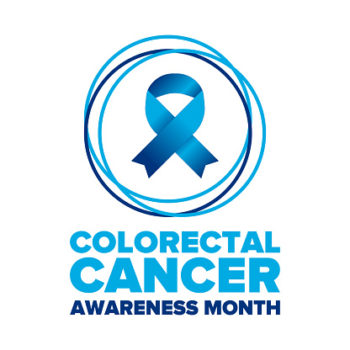March Is National Colorectal Cancer Awareness Month

Colorectal cancer includes cancers that begin in the colon and the rectum. Each year 140,000 people in the United States get colon cancer, and more than 50,000 people die from the disease, according to the Centers for Disease Control and Prevention.
It’s important to be screened for colorectal cancer as your doctor recommends. Screening is recommended beginning at age 50, and earlier for people with certain risk factors or symptoms. Insurance companies are now required to cover the cost of screening for people aged 45 and older – but talk to your doctor and check with your insurance company first.
Healthy lifestyle choices can lower the risk of colorectal cancer. The American Institute for Cancer Research (AICR) estimates that these six lifestyle changes could prevent half of all colorectal cancers:
Maintain a healthy weight and watch out for belly fat. Excess body fat is linked with an increased risk of colorectal cancer, along with nine other cancers. Research also suggests that carrying excess belly fat—regardless of weight—is a risk factor for colorectal cancer.
Starting step: Become portion-size savvy. Choose larger portions of colorful vegetables, but keep servings of calorie-packed foods like meats, cheese and nuts smaller. Limit desserts and sweets to two or three times a week in small portions.
Fit activity into your day. From housecleaning to running, the most recent reports show that moderate physical activity—of all types—reduces the risk of colon cancer. (There was insufficient evidence to make a similar conclusion regarding rectal cancer.)
Starting step: Find 10 minutes today to move, whether taking a break from work or while watching TV. Build on that over time by taking more activity breaks or extending the 10 minutes to 30 minutes.
Eat plenty of fiber. Eating a diet with plenty of high-fiber foods lowers the risk of colorectal cancer. For every 10 grams of fiber coming from foods daily—slightly less than a cup of beans—the risk of colorectal cancer is reduced by 10%.
Starting step: Move to the AICR “New American Plate” way of eating: Fill two-thirds or more of your plate with vegetables, fruits, whole grains, beans and nuts and no more than one-third with animal protein such as poultry or lean red meat.
Cut the red meat; avoid the processed. Regularly eating high amounts of red meat and even small amounts of processed meat increases colorectal cancer risk. Ounce for ounce, consuming processed meat increases the risk twice as much as consuming red meat. Processed meats include hot dogs, bacon, sausage and deli meats.
Starting step: Limit red meat consumption to 18 ounces per week—roughly the equivalent of five or six small cooked portions of beef, lamb or pork—and avoid processed meat. Try fresh roasted chicken breast, hummus or peanut butter for sandwiches.
Go moderate on the alcohol. The evidence is convincing that drinking alcohol increases colorectal cancer risk in men, and it probably increases the risk in women. When it comes to cancer risk, the best advice is: If you don’t drink, don’t start. For people who do drink, AICR recommends limiting alcohol to no more than two standard drinks daily for men; one for women.
Starting step: Become aware of how much a standard drink is by measuring the following amounts and pouring it into your glassware: 5 ounces of wine, 12 ounces of beer and 1.5 ounces of liquor.
Enjoy plenty of garlic. Evidence suggests that a diet filled with relatively high amounts of garlic reduces the risk of colorectal cancer.
Starting step: Add chopped garlic to stews, stir-fries, vegetables and roasted meats. Chop the garlic, then wait 10-15 minutes before cooking in order to activate the health-promoting ingredients.
Source: The American Institute for Cancer Research, adapted by IlluminAge. Visit the AICR website to find delicious, healthful recipes and information.
The information in this article is not intended to replace the advice of your healthcare provider. Talk to your doctor about an eating and exercise plan that is right for you.
![Family Home Health [logo]](https://www.familyhomehealthnetwork.com/wp-content/uploads/sites/250/2017/04/logo-new.png)